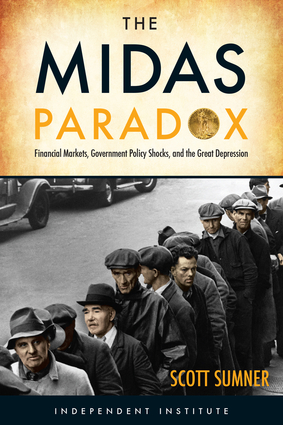Overview
In The Midas Paradox Scott Sumner provides a fresh, new narrative in regards to the Great Depression and its economic backstory. He points to various ways in which the modern day understanding of the Great Depression is flawed and how the causality of it has been largely misunderstood. The understanding held by many about the financial crisis of 2008 is mistaken as well due to the attributed similarities between this instance and the happenings of the early-mid 19th century. The book includes a broader discussion about how the understanding of economic factors and imperative to understanding these significant historical events and thus understanding of economic dynamics moving forward.Reviews
"Scott Sumner is one of the most original economists around. Having been a pioneer in making the case for nominal GDP targeting, he has now turned his insightful talents to economic history, providing an important and fresh reexamination of the causes of the Great Depression and the halting recovery thereafter. Provocative, well argued and well written, The Midas Paradox is an important contribution to our understanding of the roots of the worst economic period in the nation's history." —Robert E. Litan, Non-Resident Senior Fellow and former Vice President for Economic Studies, The Brookings Institution
"Scott Sumner is one of the preeminent monetary thinkers today. The Midas Paradox represents his twenty years' study of the Great Depression, one of the most important economic events of the twentieth century. Highly recommended." —Tyler Cowen, Holbert C. Harris Chair of Economics, George Mason University
"In The Midas Paradox, Scott Sumner provides a fascinating account of how monetary policy under the gold standard got us into the Great Depression and how wage policies under the New Deal slowed the subsequent recovery. The book is deep and rich and has important lessons for today—a must-read for anyone interested in monetary policy and history and the errors of government policy." —Douglas A. Irwin, Robert E. Maxwell '23 Professor of Arts and Sciences, Department of Economics, Dartmouth College
"Explaining the Great Depression is the 'holy grail' of macroeconomics, in the words of none other than Ben Bernanke. By combining economic theory with economic history and the history of economic thought, Scott Sumner shows how it is possible to make substantial progress on this ambitious project. Sumner may not explain everything, but he explains a lot. The Midas Paradox deserves a place on that short shelf of essential books on the Depression." —Barry J. Eichengreen, George C. Pardee and Helen N. Pardee Professor of Economics and Political Science, University of California, Berkeley
"Having done some recent research myself on the causes of the Great Depression, I have found Scott Sumner's book The Midas Paradox a source of new insights on that subject. In particular, he sheds light on why deflation proved to be such an important factor in disrupting economic activity after the 1929 Crash. He makes a properly global appraisal of monetary policy and concludes that central banks, on balance, were actually tightening the money supply when they should have been easing to offset the loss of liquidity in the financial sector from the 1929 crash. The Midas Paradox is an important contribution to the study of the Great Depression, because it adds another explanation to such known factors as ill-timed protectionism of why producer prices dropped so sharply from 1929 to 1933, causing much distress in a heavily agrarian economy." —George Melloan, former Deputy Editor, The Wall Street Journal; author, The Great Money Binge: Spending Our Way to Socialism
"In The Midas Paradox, Scott Sumner adopts an ideal method (for my taste) of writing economic history. He presents plenty of details on episodes, including pending and enacted legislation, and on contemporary consensus or disagreement on explanations and recommendations.Sumner also presents judicious amounts of statistical and econometric evidence. I find all this a gripping story." —Leland B. Yeager, Professor Emeritus of Economics, Auburn University and University of Virginia
"The Midas Paradox fills a gap in our understanding of the Great Depression. The author continues the work of a long and distinguished line of scholarship that goes back to Rueff and Mundell in pinpointing the role of the gold market and the price of gold as a key factor in some of the salient episodes of the period." —Michael D. Bordo, Board of Governors Professor of Economics and Director of the Center for Monetary and Financial History, Rutgers University
"With special attention to gold and labor market legislation, Sumner's book The Midas Paradox provides an enlightening blend of detailed, warm-bodied financial and economic history of the 1930s with its broad-based statistical counterpart, using both national income accounts and financial data. His perspective will be seen as a unique contribution to the large and still growing literature on the Great Depression." —Roger W. Garrison, Professor Emeritus of Economics, Auburn UniversityAuthor Biography
Scott Sumner is Research Fellow at the Independent Institute, Professor of Economics at Bentley University, and Director of the Program on Monetary Policy at the Mercatus Center. He edits the influential blog, "The Money Illusion." In 2012, the Chronicle of Higher Education referred to Sumner as "among the most influential" economist bloggers, along with N. Gregory Mankiw of Harvard University and Paul Krugman of Princeton University. In 2012, Foreign Policy ranked Sumner jointly with Federal Reserve Chairman Ben Bernanke 15th on its list of "100 Top Global Thinkers." He received his Ph.D. in economics from the University of Chicago. Professor Sumner is a contributor to numerous scholarly volumes, and his articles and reviews have appeared in such journals as the Journal of Political Economy; Business and Society Review; Journal of Policy Modeling; Economic Inquiry; Contributions to Macroeconomics; Economic Letters; Journal of Macroeconomics; Journal of Money, Credit and Banking; and Bulletin of Economic Research.

